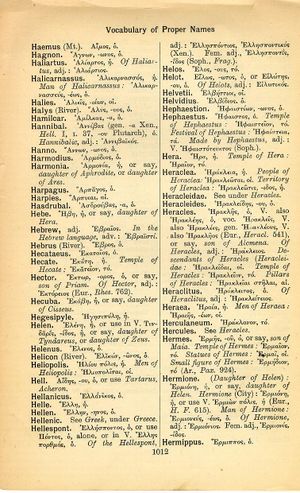Halicarnassus: Difference between revisions
Εὐνοῦχος ἄλλο θηρίον τῶν ἐν βίῳ → Eunuchus, alia vitam spurcans bestia → Ein weitres Lebensungetüm ist der Eunuch
(6_7) |
m (Text replacement - "]]>" to "]]") |
||
| Line 5: | Line 5: | ||
}} | }} | ||
{{Lewis | {{Lewis | ||
|lshtext=<b>Hălĭcarnassus</b>: (-sos) or Hali-carnāsus, i, f., = [[Ἁλικαρνασσός]] | |lshtext=<b>Hălĭcarnassus</b>: (-sos) or Hali-carnāsus, i, f., = [[Ἁλικαρνασσός]],<br /><b>I</b> a [[city]] of [[great]] [[antiquity]] in [[Caria]], the birthplace of the historians [[Herodotus]] and [[Dionysius]], also [[celebrated]] for the mausolēum erected [[there]], [[now]] Bodrun or Boudroum, Mel. 1, 16, 2 and 3; Plin. 5, 29, 29, § 107; Cic. Tusc. 3, 31, 75; id. Q. Fr. 1, 1, 8, § 25; Liv. 37, 10, 11. —<br /><b>II</b> Derivv.<br /> <b>A</b> Hălĭcarnasseus, ĕi and ĕos, m. adj., = Ἁλικαρνασσεύς, of [[Halicarnassus]]: [[Scylax]], Cic. Div. 2, 42, 88: [[Dionysius]], Quint. 3, 1, 16: [[Cleon]], Nep. Lys. 5.—<br /> <b>B</b> Hălĭcarnassĭi, ōrum, m., the inhabitants of [[Halicarnassus]], Halicarnassians, Tac. A. 4, 55.—<br /> <b>C</b> Hălĭcarnas-senses, ĭum, m., the [[same]], Liv. 33, 20, 12. | ||
}} | }} | ||
Revision as of 09:29, 13 August 2017
English > Greek (Woodhouse)
Ἁλικαρνασσός, ἡ.
Man of Halicarnassus: Ἁλικαρνασσεύς, -έως, ὁ.
Latin > English (Lewis & Short)
Hălĭcarnassus: (-sos) or Hali-carnāsus, i, f., = Ἁλικαρνασσός,
I a city of great antiquity in Caria, the birthplace of the historians Herodotus and Dionysius, also celebrated for the mausolēum erected there, now Bodrun or Boudroum, Mel. 1, 16, 2 and 3; Plin. 5, 29, 29, § 107; Cic. Tusc. 3, 31, 75; id. Q. Fr. 1, 1, 8, § 25; Liv. 37, 10, 11. —
II Derivv.
A Hălĭcarnasseus, ĕi and ĕos, m. adj., = Ἁλικαρνασσεύς, of Halicarnassus: Scylax, Cic. Div. 2, 42, 88: Dionysius, Quint. 3, 1, 16: Cleon, Nep. Lys. 5.—
B Hălĭcarnassĭi, ōrum, m., the inhabitants of Halicarnassus, Halicarnassians, Tac. A. 4, 55.—
C Hălĭcarnas-senses, ĭum, m., the same, Liv. 33, 20, 12.

